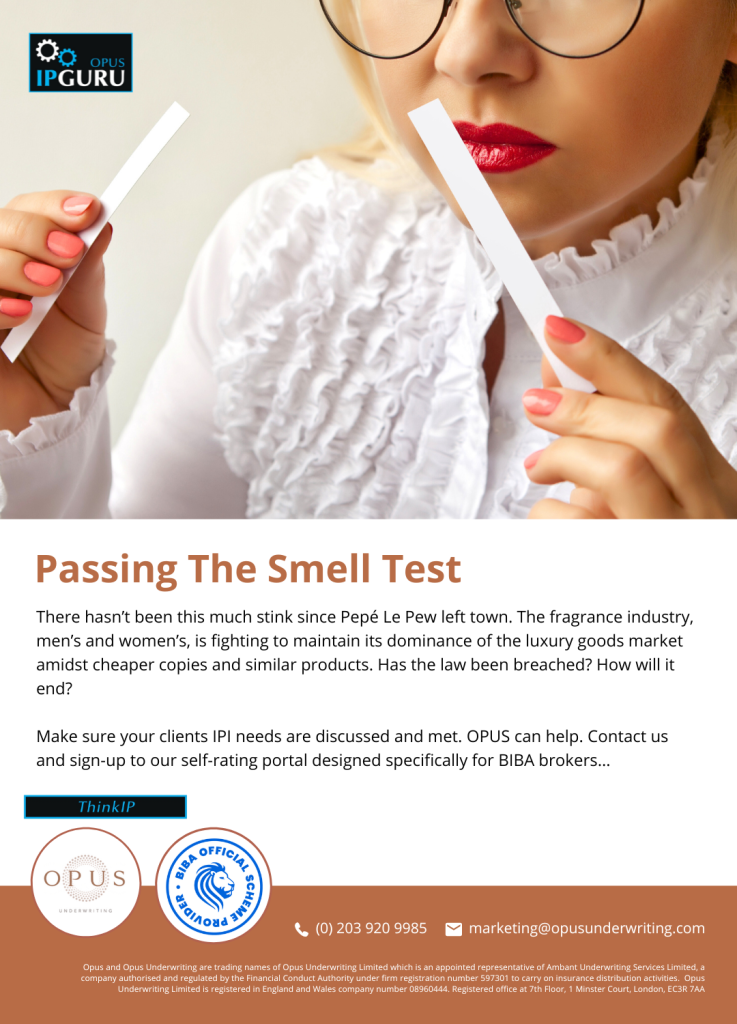Something smells fishy…
Unleash the Aroma
You might soon hear the word “Dupe” in relation to a perfume or fragrance. The Cockney vernacular has a similar word, the noun – “Snide”. Broadly meaning a cheap copy or fake. Because sneaky it is and in a snidey way. Good quality, branded perfume is expensive and where there exists a premium price, so too lies an opening for a cheaper alternative that looks, and in this case, smells the same.
It’s human nature to want the best in the market – but cheaper than RRP. Whether securing inexpensive copied goods comes with bragging rights, a warm glow of self-satisfaction or both, is unclear, but it certainly undermines the ‘kosher’ fragrance market. Those peddling such borderline wares and there are many on-line vendors (mostly on TikTok), will counter by saying the legit’ products are puffed-up in price in the first place. A positive consumer-supporting argument, maybe, a defence in intellectual property law – maybe not.
Smell the Difference, Feel the Best
A cheap copy or fake is straightforward enough but what’s happening in the perfume market with dupes is a banana-shaped, foggy haze. Simply put, a dupe differs from a snide. This is because dupe houses (fragrance factories) are creating products they say are “influenced by” a top brand and smell similar. So, it’s not a fake product, it’s a something of a hybrid.
They remain, just about, on the right side of the law because copyright protection regulations are a bit ‘rubbish’ when it comes to smells, and these dupes are not pretending to be the real thing, so it’s not counterfeit.
Trademark law typically fails because it’s not designed to protect items with a practical use. Smells can’t usually be trademarked because their basic function is to make you smell nice. A better protection might be the use of the trade secrets and confidentiality laws in respect of the ‘recipe’ for a particular fragrance. Enter the gas chromatograph (me neither).
Used to determine the cause of accelerators in unlawful fires and to check athletes’ urine for banned drugs, the gas chromatograph is now used by dupe houses to understand the ingredients and compounds of a branded perfume. Reverse engineer the readings and hey presto! you’ve nailed the target scent. Just box it up, pile it high, sell it cheaply and watch the money roll in. And ‘boy’, does it roll in…in the millions.
That pesky gas chromatograph has the fine perfumiers acting like dogged hunt saboteurs busily trying to undermine its accuracy with false scent trails, enough to cock-up the reading but not enough to change the smell of the end-product.
The scent of individuality
There’s gold in them there quirky-shaped bottles. When you consider around only 1% of the cost of a perfume is its ingredients the mark up seems a bit rich. But then there’s the brand and imagery to build, all that advertising, granted most of which is so whimsical it doesn’t make much sense to viewers, but we get that it’s expensive and will be cherished by the recipient at Christmas. Just marketing doing its job. Ours is not to reason why…and all that.
As one commentator put it, you don’t measure the value of a Picasso by its volume of paint. Sure, you don’t but can the creator of something that smells quite nice be equated with a genre-creating master like Picasso? Perhaps they can. Fine perfumiers are skilful and secretive individuals. It’s said that two can work on the same floor of a perfume factory and not know the ingredients of each other’s product. If that is true, I’m not sure whether that’s reassuring or just plain daft given their employer will usually own the IP to both.
Your Signature Scent is Calling
Whatever, dupes are proliferating and making millions of pounds for their factory owners at the cost, it must be said, of the big brands. That doesn’t seem right using the ‘Picasso reasoning’ but perhaps it’s simply the vast profit margin that stokes the fire and calls the public to purchase a dupe ‘smell-alike’.
It’s all a bit of a bunfight really. Luxury perfumiers copying each other, dupe houses copying big brands, fashion houses bandwagon-like, using dupe houses and small outsourced perfume compounding houses (of which there aren’t that many) to create scents they can make a small fortune flogging because of cheap production costs. Quite a melee. You can almost hear the out-of-tune piano playing in the saloon bar as the behaviour gets rowdier.
An industry whistle-blower recently said that at its worst excess the greedy fashion brands:
“…get perfumes as cheap as possible from a fragrance house to put it in a bling bling bottle and sell it as expensively as possible”.
I am what I live
So, are you paying a lot of money for a novelty-boxed, premium brand – Picasso-like – for the years of perfumier experience, or has it all got out of hand, is a bit of an over-priced con’ and it’s time for an industry code of ethics to straighten it all out?
Take your pick. But where you might reasonably expect the law to step in and stop this rapacious plagiarism, it isn’t. In fact, it’s spectacularly absent. That’s not good for anyone.
Perfume town needs a new sheriff.
Murray Fairclough
Marketing Director
OPUS Underwriting Limited
+44 (0) 780 145 9940
underwriting@opusunderwriting.com
Research by Ben Fairclough








